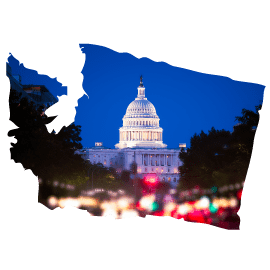Licensure Reciprocity: Washington
Expanding the Pool of Teachers Policy
Analysis of Washington's policies
Washington could do more to support licensure reciprocity for certified teachers from other states.
Commendably, Washington only provides testing waivers to teachers who have attained National Board Certification. All other out-of-state teachers, no matter how many years of experience they have, must meet Washington's passing scores on licensing tests.
However, other aspects of the state's policy create obstacles for teachers from other states seeking licensure in Washington. Teachers with valid out-of-state certificates are eligible for Washington's Residency Certificate. There appear to be no recency or coursework requirements for applicants who completed a state-approved preparation program; however, alternate route teachers must have three years of experience and have participated in a supervised classroom-based internship during the course of the alternate route program.
Those with less than three years of experience are likely subject to transcript reviews, an exercise that often leads the state to require additional coursework before it will offer a license. States that reach a determination about an applicant's licensure status on the basis of the course titles listed on the applicant's transcript may end up mistakenly equating the amount of required coursework with the teacher's qualifications.
Washington is also a participant in the NASDTEC Interstate Agreement; however, the latest iteration of this agreement no longer purports to be a reciprocity agreement among states and thus is no longer included in this analysis.
Recommendations for Washington
Accord the same license to out-of-state alternate route teachers as would be accorded to traditionally prepared teachers.
Regardless of whether a teacher was prepared through a traditional or alternate route, all certified out-of-state teachers should receive equal treatment. The state's policy of transcript reviews would appear to imply that lacking a clear match with Washington's own professional requirements, the teacher would have to begin anew, repeating some, most or all of a preparation program in Washington.
Washington should also reconsider its experience requirement for alternate route teachers, as it may deter talented teachers from applying for certification, namely those who participate in programs such as Teach For America, an alternate route in which teachers participate for two years.
State policies that discriminate against teachers who were prepared in an alternate route are not supported by evidence. In fact, a substantial body of research has failed to discern differences in effectiveness between alternate and traditional route teachers.
State response to our analysis
Washington asserted that reciprocity is not based on certification, but whether the teacher completed a state-approved preparation program. The state added that out-of-state candidates who don't complete a state-approved preparation program in another state that requires a field experience can only be eligible for certification if they have three or more years of teaching experience.
Washington also contended that it does not conduct transcript analysis. Candidates with less than three years of experience either need to finish the requirements of a state-approved program in their home state, or get a teaching job in Washington and enroll in an alternate route program while teaching on a conditional certificate.
Select another topic
Delivering Well Prepared Teachers
- Admission into Preparation Programs
- Elementary Teacher Preparation
- Elementary Teacher Preparation in Reading Instruction
- Elementary Teacher Preparation in Mathematics
- Middle School Teacher Preparation
- Secondary Teacher Preparation
- Secondary Teacher Preparation in Science
- Secondary Teacher Preparation in Social Studies
- Special Education Teacher Preparation
- Assessing Professional Knowledge
- Student Teaching
- Teacher Preparation Program Accountability
Expanding the Pool of Teachers
Identifying Effective Teachers
- State Data Systems
- Evaluation of Effectiveness
- Frequency of Evaluations
- Tenure
- Licensure Advancement
- Equitable Distribution
Retaining Effective Teachers
Exiting Ineffective Teachers
Research rationale
http://www.ncbex.org/ .

